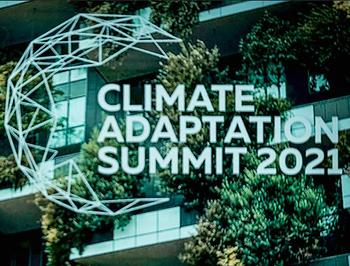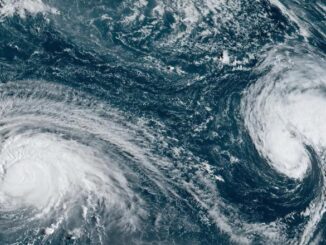
THE HAGUE, The Netherlands, January 26, 2021 (ENS) – As Earth’s climate heats up, a new international coalition is forming to tackle the impacts of global climate change, UK Prime Minister Boris Johnson announced Monday. Johnson was speaking at the virtual Netherlands-hosted Climate Adaptation Summit <www.cas2021.com>- the first global summit focused solely on adaptation and resilience.

The Climate Adaptation Summit, linked with the annual World Economic Forum that opened in Davos, Switzerland on Monday, concentrated on finding solutions to adapt to the effects of climate change, such as more frequent and damaging hurricanes and typhoons, extreme rainfall, drought, heat, wildfires, extinctions, melting glaciers and rising sea levels.
Addressing world leaders, Prime Minister Johnson launched the Adaptation Action Coalition, developed by the UK in partnership with Egypt, Bangladesh, Malawi, the Netherlands, Saint Lucia and the United Nations.
The new coalition intends to help developed and developing countries alike share their knowledge and best practices on local, regional and global solutions for dealing with climate change.
“It is undeniable that climate change is already upon us and is already devastating lives and economies. We must adapt to our changing climate, and we must do so now,” Johnson said.
“I’ll be making the need for a resilient recovery a priority of the UK’s G7 presidency this year,” the Prime Minister said.
“To make sure we get not just warm words but real change,” he said, “I am today launching an all-new Adaptation Action Coalition to set the agenda ahead of COP26.”

The UN’s 26th annual climate summit, COP26, was originally scheduled for last autumn but was postponed due to the pandemic.
“Let’s work together to adapt, to become more resilient, and to save lives and livelihoods all around the world,” Johnson said.
Emma Howard Boyd, who chairs the UK’s Environment Agency and serves as UK Commissioner to the Global Commission, focused on ways that cities can invest in nature-based solutions to tackle the impact of climate change.
“Today’s summit follows significant flooding across the country last week. We know that the climate emergency is bringing more intense rainfall events, which is why local communities are vital in the response,” she said.
“Last week, flood defences protected tens of thousands of people in England from record river levels during Storm Christoph. Investments in flood protections help economic development and also improve health and wellbeing by enhancing green and blue spaces,” said Boyd.
“The Environment Agency, government and local partners have a lot of expertise to share with the world, and we also have a lot to learn. International collaboration, as championed by this coalition, is vital,” Boyd maintained.
USA Returns to the Climate Scene
The opening session of the Climate Adaptation Summit featured the return of the United States, the world’s second-largest emitter of greenhouse gases, to the climate action arena.
U.S. President Joe Biden, a Democrat, took office in Washington, DC on January 20; on Monday his Envoy for Climate, former U.S. Secretary of State John Kerry, made his debut address in his new role.
Speaking by video link at the first global summit on climate adaptation, Kerry said, “We’re proud to be back. We come back with humility for the absence of the last four years, and we’ll do everything in our power to make up for it,” he told the world leaders.
Kerry said the climate is a top priority for President Biden. “We have a president now, thank God, who leads and tells the truth … and he knows that we have to mobilize in unprecedented ways to meet this challenge that is fast accelerating, and we have limited time to get it under control,” he said.
The United States is working on a national plan, known as a Nationally Determined Contribution, to be submitted to the United Nations under the Paris Agreement on Climate, for emissions reductions to 2030. That would be published “as soon as practicable,” Kerry promised.
There will also be financial assistance to the poorest and most vulnerable, he assured the summit audience, saying, “We intend to make good on our climate finance pledge.”
Financial help from the United States to poorer countries struggling with the impacts of climate-related disasters slowed to a trickle during Republican President Donald Trump’s term in office, as he declined to keep up U.S. payments into the global Green Climate Fund.
In the long term, driving towards net zero emissions no later than 2050 and keeping a 1.5°C warming limit within reach remain the best policies for climate resilience and adaptation. Kerry explained.
Kerry called on countries to “treat the crisis as the emergency that it is” by reducing greenhouse gas emissions and warned that the costs of coping with the climate change are escalating, with the United States spending more than $265 billion (£194bn) in one year after three storms. “We’ve reached a point where it is an absolute fact that it’s cheaper to invest in preventing damage or minimizing it at least than cleaning up.”

Adaptation to the impacts of extreme weather must be accompanied by deep emissions cuts, Kerry warned. “There is no adapting to a 3°C or 4°C world, except for the very richest and most privileged. Some of the impacts are inevitable, but if we don’t act boldly and immediately by building resilience, we will see dramatic reversals in economic development for everybody, and the poorest and most vulnerable communities will pay the highest price.”
Kerry urged all countries to contribute to the upcoming United Nations COP26 climate summit in Glasgow, Scotland this November, with commitments to reach net-zero emissions by mid-century and national plans to reduce greenhouse gases by 2030.
U.S. and China Join in Climate Action With Other Nations
Addressing the Climate Adaptation Summit via video link from Beijing, Chinese Vice Premier Han Zheng Monday called for all countries to make joint efforts to enhance climate adaptation action and work for new progress in global climate governance.
Han said that climate change is the common challenge facing humanity, and its response requires accommodating both mitigation and adaptation.
China has attached equal importance to mitigation and adaptation, he said, adding that China is formulating a national strategy of adapting to climate change for 2035 and would make the country more resilient to climate risks.
At the opening session Monday, world leaders heard from German Chancellor Angela Merkel and French President Emmanuel Macron. President Macron reaffirmed that €2 billion (US$2.43 billion), one-third of France’s climate finance aid, will be invested in climate adaptation. German Chancellor Angela Merkel committed an extra €270 million for adaptation.
All the contributions, initiatives, programs and best practices discussed during the two-day Climate Adaptation Summit will be included in an Adaptation Action Agenda that details practical climate solutions for this decade.

UN Secretary‐General Antonio Guterres addressed the summit Monday, calling for 50 percent of the total share of climate finance provided by all developed countries and multilateral development banks to be allocated to adaptation and resilience.
“I urge all donors and multilateral development banks to commit to this goal by COP26 and deliver on it at least by 2024,” said Guterres.
“Climate risk must be embedded in all procurement processes, particularly for infrastructure,” Guterres said, advising the world to scale-up existing “catastrophe-triggered financial instruments” to support economies affected by disasters.
International Monetary Fund Managing Director Kristalina Georgieva called climate change, “a fundamental risk to economic and financial stability” and also “an opportunity to reinvigorate growth and create new green jobs.”
“Our research shows that combining steadily rising carbon prices with a green infrastructure push can boost global GDP over the next 15 years by about 0.7 percent and generate work for millions of people. This is why at the IMF we embrace the transition to the new climate economy – one that is low carbon and climate resilient, that helps fight the causes of climate change and adapt to its consequences,” Georgieva said.
President Joko Widodo of Indonesia, President Ali Bongo Ondimba of Gabon, Prime Minister Narendra Modi of India, Prime Minister Sheikh Hasina of Bangladesh, and President Alberto Fernández of Argentina discussed their contributions to a climate‐resilient future Monday.
In addition, over 30 world leaders expressed their support for climate adaptation in online messages, promising action, unveiling concrete initiatives or committing to raise adaptation funding.
What the Scientists Think
Last week, ahead of the Climate Adaptation Summit, more than 3,000 scientists from 110+ countries issued a statement calling for a stronger global effort to protect people and nature from the effects of rising temperatures, as researchers estimate funding to adapt to climate change has fallen because of the COVID-19 pandemic.
The scientists signed the “Groningen Science Declaration” calling on world leaders, decision-makers and investors, to change the way we understand, plan and invest for a changing climate to ensure we limit future damage.
The statement, initiated by Patrick Verkooijen, CEO of the Global Center on Adaptation<http://www.gca.org/>, which organized the summit with the Dutch Government, says that global climate adaptation funding needs to increase 10-fold, to US$300 billion a year, to respond to escalating climate risks.
Former UN Secretary-General Ban Ki-moon now chairs the Global Center on Adaptation. He told the summit, “Even if mitigation targets outlined in the Paris Agreement are reached, it still won’t be enough. Climate change is already happening and so we must adapt to its impacts. The Groningen Scientific Declaration makes it clear that we, as humans, have caused climate change and so we must accelerate adaptation to ensure we can all live in a sustainable and resilient world that leaves no-one behind.”
The scientists, including five Nobel laureates, warned that a failure to respond would have severe consequences, especially for the poorest. “Unless we step up and adapt now, the results will be increasing poverty, water shortages, agricultural losses and soaring levels of migration with an enormous toll on human life,” they wrote.
A changing climate, including more severe floods and droughts, could depress growth in global food production by up to 30 percent by 2050, while rising seas and greater storm surges could destroy urban economies and force hundreds of millions of coastal dwellers from their homes, they warned.
To avoid that, major new efforts are needed to conserve nature – including forests, wetlands and coral reefs – as is a planning revolution to make cities, transport, energy and other infrastructure safer from climate shocks, the scientists said. Better education, especially for girls, and redeployment of the world’s existing financial resources would enable adaptation on the massive scale required.
The Climate Adaptation Summit 2021 ended Tuesday, with the event’s host, Dutch Minister of Infrastructure and Water Management Cora van Nieuwenhuizen, expressing satisfaction with the outcome.
“I’m thrilled that our mission to accelerate climate adaptation around the world is succeeding,” van Nieuwenhuizen said at a press briefing after the last session. “It’s incredible how much energy has come together at this summit. World leaders are announcing concrete and ambitious plans. Promising multi-stakeholder initiatives are born. Knowledge and best practices are shared. A great boost to climate adaptation.”
“We have heard so many game-changing initiatives to make the world more resilient,” van Nieuwenhuizen said. “It was the first climate summit since a long time where China and the United States stood side-by-side to affirm their commitment to climate action.”
Copyright Environment News Service (ENS) 2021. All rights reserved.



